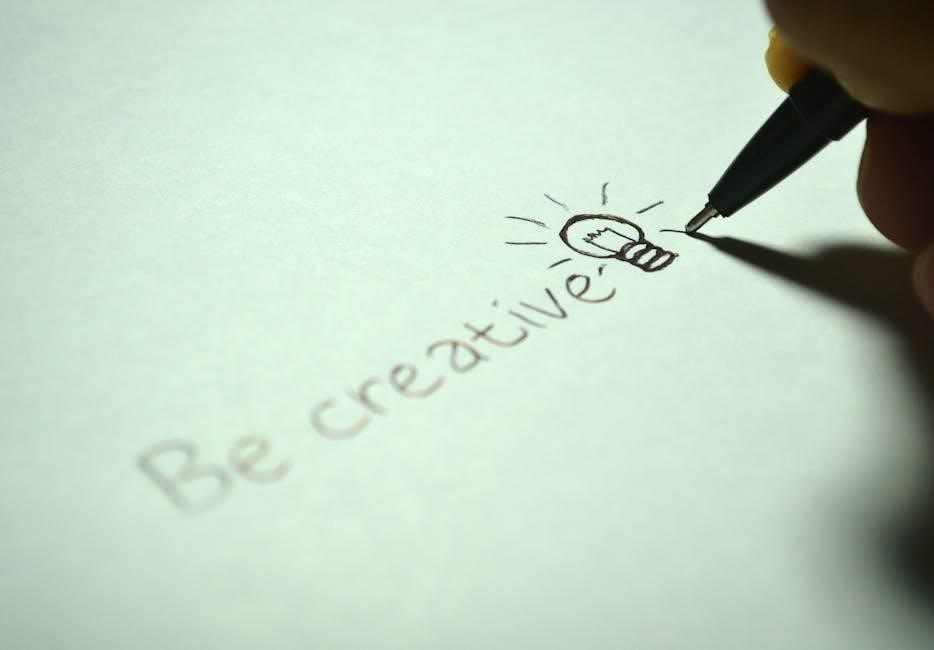the art of self-learning pdf
The art of self-learning empowers individuals to take control of their education‚ fostering personal growth and mental discipline. This approach emphasizes autonomy‚ allowing learners to align their studies with personal and professional goals‚ as highlighted in resources like The Art of Self-Directed Learning PDF‚ which offers practical strategies for effective self-education;
Understanding the Concept of Self-Directed Learning
Self-directed learning is a learner-centered approach where individuals take full responsibility for their education. It involves setting personal goals‚ identifying resources‚ and managing time effectively to achieve meaningful outcomes. This method emphasizes autonomy‚ allowing learners to tailor their studies to align with their interests and professional aspirations. By fostering critical thinking and problem-solving skills‚ self-directed learning empowers individuals to adapt to changing environments and pursue lifelong growth. Resources like The Art of Self-Directed Learning PDF provide practical insights and strategies to help learners master this approach and stay motivated.
Benefits of Self-Learning
Self-learning offers autonomy‚ personalization‚ and efficiency‚ allowing individuals to tailor their education to personal and professional goals. It fosters mental toughness and self-discipline‚ ensuring long-term success.
Autonomy and Personalization in Learning
Autonomy and personalization are cornerstone benefits of self-learning‚ enabling individuals to tailor their education to personal interests and professional aspirations. Learners gain the freedom to choose topics‚ set pace‚ and select resources‚ fostering deeper engagement. This approach allows for a highly customized learning experience‚ ensuring relevance and motivation. As highlighted in The Art of Self-Learning PDF‚ self-directed learners can focus on subjects that genuinely matter to them‚ aligning their education with real-world applications and goals. This independence cultivates a sense of ownership and accountability‚ making the learning process more meaningful and effective.
Efficiency and Relevance in Achieving Personal Goals
Self-learning enhances efficiency by allowing individuals to focus solely on topics relevant to their objectives‚ eliminating unnecessary material. This targeted approach streamlines the learning process‚ making it more effective. As discussed in The Art of Self-Learning PDF‚ learners can prioritize skills or knowledge directly tied to their personal and professional goals‚ ensuring each study session contributes meaningfully to their progress. By aligning learning with specific outcomes‚ self-directed learners achieve greater productivity and satisfaction‚ as their efforts are consistently directed toward what truly matters.
Key Techniques for Effective Self-Learning

Effective self-learning involves setting clear goals‚ managing time efficiently‚ and engaging actively with material. Techniques like goal-setting‚ scheduling‚ and mental toughness are emphasized in The Art of Self-Learning PDF.
Goal-Setting Strategies for Motivation
Goal-setting is a cornerstone of self-learning‚ as outlined in The Art of Self-Learning PDF. Clear‚ realistic‚ and challenging objectives maintain motivation. Breaking goals into smaller steps ensures progress tracking‚ fostering momentum and confidence. Aligning goals with personal values enhances commitment‚ while flexibility allows adapting to changing priorities. Regular reflection helps in refining objectives‚ keeping learners focused and driven. These strategies not only structure the learning process but also cultivate discipline and accountability‚ essential for long-term success in self-directed education. By setting meaningful goals‚ learners stay motivated and directed‚ achieving their full potential.
Time Management and Scheduling for Consistency
Effective time management is crucial for consistent self-learning‚ as emphasized in The Art of Self-Learning PDF. Creating a structured schedule helps balance productivity with personal reflection‚ ensuring steady progress. Learners should allocate specific time blocks for focused study‚ breaks‚ and reviews; Practical tools like calendars and to-do lists can enhance organization. Prioritizing tasks and avoiding overcommitment prevents burnout. Regularly reviewing and adjusting schedules ensures alignment with learning goals. By mastering time management‚ self-learners maintain consistency‚ achieve milestones‚ and sustain long-term progress in their educational journey. A well-planned schedule fosters discipline and maximizes the effectiveness of self-directed learning efforts.
Active Learning and Engagement Methods

Active learning is a cornerstone of effective self-directed education‚ as highlighted in The Art of Self-Learning PDF. Engaging methods such as hands-on experiments‚ problem-solving‚ and collaborative discussions enhance retention and understanding. Techniques like teaching others‚ creating projects‚ and applying knowledge to real-world scenarios foster deeper comprehension. Additionally‚ incorporating multimedia resources like videos and podcasts diversifies learning experiences. Regular self-assessment through quizzes and reflections ensures learners stay aligned with their goals. By actively engaging with material‚ self-learners cultivate critical thinking and practical skills‚ making the learning process both meaningful and impactful. These methods transform passive absorption into dynamic‚ results-driven education.

Overcoming Distractions and Building Self-Discipline

Mastering self-discipline involves aligning actions with priorities‚ minimizing distractions‚ and cultivating mental toughness‚ as emphasized in The Art of Self-Learning PDF for long-term success.
Identifying Personal Distractions and Minimizing Them
Recognizing personal distractions is the first step toward effective self-learning. Common distractions include digital devices‚ procrastination‚ and external noise. To minimize them‚ learners can create a structured schedule and a dedicated learning environment. Techniques like time blocking and prioritizing tasks help maintain focus. The Art of Self-Learning PDF suggests practical strategies‚ such as identifying triggers and implementing boundaries. By understanding what disrupts your concentration‚ you can develop systems to avoid or manage these interruptions. This self-awareness is crucial for building discipline and ensuring consistent progress in your learning journey.

Cultivating Mental Toughness for Long-Term Success
Mental toughness is a cornerstone of successful self-learning‚ enabling learners to persevere through challenges. It involves developing resilience‚ self-discipline‚ and a growth mindset. By consistently aligning actions with goals‚ learners build the stamina to overcome obstacles. Techniques such as breaking tasks into manageable steps and reflecting on progress can foster persistence. The Art of Self-Learning PDF emphasizes that mental toughness is not innate but cultivated through practice. Embracing setbacks as learning opportunities and maintaining self-belief are key to sustaining long-term success in self-directed learning.

Resources for Self-Learners
The Art of Self-Learning PDF offers practical advice‚ inspiring stories‚ and actionable steps to master self-directed education‚ providing learners with valuable tools for personal and professional growth.
Recommended Books and PDF Guides
The Art of Self-Directed Learning PDF is a top recommendation‚ offering practical advice and inspiring stories to guide learners. Other notable books include works by experts in self-education‚ providing strategies for mental toughness and goal-setting. These resources are designed for various audiences‚ from students to professionals‚ ensuring personalized growth. Many PDF guides are freely available‚ making high-quality learning accessible. They emphasize autonomy‚ relevance‚ and efficiency‚ helping learners stay focused and motivated. These materials are invaluable for anyone seeking to master self-learning techniques and achieve long-term success in their educational journeys.
Online Communities and Support Networks
Online communities and support networks play a vital role in fostering self-learning by connecting individuals worldwide. Forums‚ social media groups‚ and dedicated platforms offer spaces to share resources‚ experiences‚ and challenges. Websites like Reddit and specialized learning forums provide valuable insights and encouragement. Platforms such as Coursera and Khan Academy often include community features for discussion and collaboration. These networks help learners stay motivated‚ gain diverse perspectives‚ and overcome isolation. They also serve as hubs for discovering recommended books and guides‚ such as The Art of Self-Directed Learning PDF‚ making them indispensable for continuous growth and development.

The Role of Continuous Learning in Personal Growth
Continuous learning is transformative‚ enabling individuals to stay relevant‚ achieve personal and professional goals‚ and foster resilience in a rapidly changing world‚ as emphasized in The Art of Self-Directed Learning resources.
Adapting to Changing Dynamics in Education
Adapting to changing educational trends requires self-learners to embrace flexibility and innovation. With resources like The Art of Self-Directed Learning PDF‚ learners can navigate shifting landscapes by prioritizing relevance and personalization. This approach allows individuals to stay aligned with evolving goals‚ ensuring their education remains dynamic and purposeful. By integrating new strategies and tools‚ self-learners maintain a competitive edge‚ fostering continuous growth in both personal and professional contexts.
Embracing Lifelong Learning for Professional Development
Lifelong learning is essential for professional growth‚ enabling individuals to adapt to industry changes and enhance their expertise. Self-learning empowers professionals to acquire new skills and knowledge at their own pace‚ aligning with career goals. Resources like The Art of Self-Directed Learning PDF provide practical tools to stay competitive‚ offering insights into personalized education and mental toughness. By embracing self-learning‚ professionals can continuously evolve‚ ensuring long-term success in dynamic work environments. This approach fosters resilience and adaptability‚ key traits for thriving in today’s fast-paced professional world.
